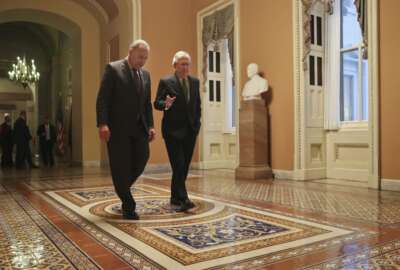
Dec. 21 deadline leaves Senate no time to consider recommendations designed to avoid budget mayhem
Congress' latest Dec. 21 deadline leaves the Senate no time to consider a series of recommendations from a joint budget and appropriations reform committee that...
As Congress this week put the finishing touches on its second continuing resolution of the year, a joint committee that formed to prevent this exact scenario couldn’t move a single recommendation forward to change the existing budget and appropriations process.
The Joint Select Committee on Budget and Appropriations Process Reform didn’t clear a series of recommendations that members had spent the past 10 months drafting to change the congressional budgetary procedures.
The committee was supposed to draft legislative language that would “significantly reform the budget and appropriations process, according to the Bipartisan Budget Act of 2018, which mandated the joint committee’s existence. The committee’s report offered up six rough recommendations designed to improve the budgetary process.
It needed five votes from each party to move the report to the House and Senate for consideration.
But the joint committee couldn’t agree to move the recommendations forward, knowing that congressional leadership couldn’t agree on a plan to consider the budget reform report on the Senate floor. Even if they could, Senate majority leadership didn’t have an interest in taking floor time to discuss the budget report in the short time before the year ends, Sen. Sheldon Whitehouse (D-R.I.), a member of the budget reform committee, said Nov. 29.
“I don’t think this is a partisan thing,” he said. “I’m not trying to take any partisan shots here. That’s just the fact of the matter. The majority leader has better uses, in his view, for the time that remains in this Congress, and the minority has parliamentary prerogatives that it seeks to defend in the absence of an agreement. Therefore, there we are.”
Perhaps the biggest, glaring tasks that the majority leader wants to spend the rest of the year on are the remaining seven appropriations bills where lawmakers haven’t finalized fiscal 2019 funding. Both the House and Senate on Thursday quickly passed a temporary, two-week continuing resolution through Dec. 21 to avoid a partial government shutdown.
The irony of the situation wasn’t lost on the joint committee members, who devoted months to discussions designed to avoid the very situation they’re currently in.
“At best we’ll be able to say it almost worked and we almost got our job done. It could make it harder to pursue this path another time,” Sen. Roy Blunt (R-Mo.) said. “There’s nothing that we know today that we didn’t know when we started about how the Senate works and how the House works.”
Several members said the committee’s recommendations weren’t strong or significant enough. The signature recommendation in the committee’s report reiterated a procedure that Congress already practices in most cases: drafting budget resolutions two years at a time.
“We were tasked with providing recommendations to significantly reform the budget and appropriations process,” Sen. Joni Ernst (R-Iowa), a joint committee member, said. “Switching to a biennial budget resolution is not in my estimation a significant reform. In fact, we already do this. The very statute that created this committee was a two-year budget agreement. Over the course of this markup we have adopted some good amendments, but these changes aren’t going to move the needle on the problems that we set out to address.”
The committee tried to pass an amendment that would have forced lawmakers to stay in Washington until they reached a budget agreement. The amendment failed.
Nothing in the final committee package will make CRs and shutdowns less likely, Sen. James Lankford (R-Okla.) said.
“This was the place that I thought we would hammer through some very difficult ideas and then go sell them to the rest of the body, because the other members of the House and the Senate are not processing through what we’re processing through,” he said.
But Whitehouse and Lankford said they were hopeful the joint committee members could continue to push forward some of the ideas they had discussed in the new Congress.
But the current situation is disappointing, Lankford said.
“Our mandate began with significant reform,” he said. “My fear is that if we come out and have a vote, and even if it passes the House and the Senate, and everyone walks away and says, ‘we now do budgeting every two years; we did our significant reform.’ We all know in this room nothing really changed, and we’ll have the exact same issues next year again.”
Copyright © 2025 Federal News Network. All rights reserved. This website is not intended for users located within the European Economic Area.
Nicole Ogrysko is a reporter for Federal News Network focusing on the federal workforce and federal pay and benefits.
Follow @nogryskoWFED





